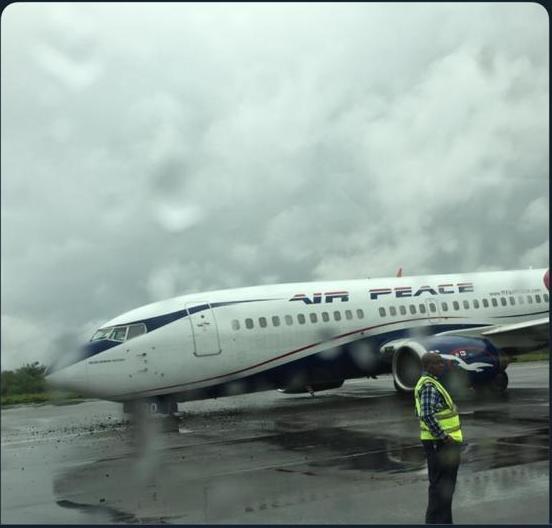News
Air Peace incident: NCAA defends decision to clear co-Pilot

The Nigerian Civil Aviation Authority (NCAA) has provided clarification on its decision to clear the co-pilot of Air Peace, who was initially linked to an investigation involving colleagues accused of drug and alcohol use.
The clarification comes in the wake of a runway excursion involving an Air Peace aircraft on Sunday, June 13, at the Port Harcourt International Airport. The aircraft veered off the runway after landing but, fortunately, sustained no damage.
According to the Nigerian Safety Investigation Bureau (NSIB), findings showed that the aircraft touched down 2,264 metres from the runway threshold, significantly beyond the recommended touchdown zone. It eventually rolled to a stop 209 metres into the clearway, raising concerns about crew judgment and performance.
READ ALSO: NCAA summons domestic airlines over flight delays, disruptions
Platinumpost reports that the Nigeria Safety Investigation Bureau had indicted the crew members concerned following a medical test of their bloodstreams. The airline has since faulted this indictment
Speaking on the matter during an X space on Saturday, the Director of Public Affairs and Consumer Protection at the NCAA, Michael Achimugu emphasised that the regulatory body followed due process based on the available facts and internal investigations.
He explained that both the NCAA internal investigation and the NSIB report did not indict the co-pilot, the reason for his clearance and return to work.
He also said the durability of the NCAA rules is occasionally tested by real-life incidents, saying this was why the rules are subjected to reviews consistently.
“I learnt yesterday that the NCAA was being blamed for giving clearance to the first officer. But based on the NCAA internal findings and the NSIB preliminary report, the co-pilot was not found culpable.
“In fact, he advised the captain to go around, which the captain did not heed. Given that, we believe it is unjust to keep someone grounded for a year while an investigation is ongoing if there is no evidence of wrongdoing.” Achimugu said.
Speaking on airlines’ internal measures, the NCAA publicist said, “Airlines are allowed to have internal policies and mechanisms on certain issues, and they are required to submit compliance reports to the authority. However, as is the case globally, no matter how sound regulations may appear on paper, their true strength is only revealed when tested by real-life incidents. That is why regulations remain subject to review and updates.”
The Director, however, pointed out that the matter would be addressed by the Director General of the NCAA, Capt Chris Najomo, who is already conducting investigations on the matter.
He further clarified that the NCAA follows internationally recognised procedures for post-incident assessments, including the use of NCAA-approved testing centres.
He also noted that some questions remain unanswered, particularly on the side of the Nigerian Safety Investigation Bureau, which is the statutory body responsible for conducting accident and incident investigations in the country.
He said, “I have reached out to the NSIB and spoken to their team, but I’m still waiting for comprehensive feedback. I flagged certain inconsistencies that I believe require urgent clarification. My DG has just returned to the country and is expected to speak to the matter formally tonight.”
Meanwhile, a participant of the space meeting, Bamidele Badmos, expressed concern over how the airline has managed the public discourse surrounding the incident.
“My concern right now is the image of the airline. Air Peace operates international routes, and if Nigerians continue to treat issues like this with levity, our Bilateral Air Services Agreements could be jeopardised.”
He stressed that regulatory standards must be applied uniformly across the board, regardless of the individuals or airlines involved.
“This industry operates on very high standards. It cannot be run like a typical business. Once an infraction occurs, caution must be exercised immediately. The rules are clear; they are not optional. If someone is found wanting, it’s not a time to start defending or raising unnecessary alarms,” Badmos added.
He also cautioned airline personnel against making informal media appearances or public comments that could worsen the situation.
He said, “It’s highly informal for staff members to come on air to defend the airline or challenge regulatory authorities. Issues like this should be left to official channels and professionals.”























